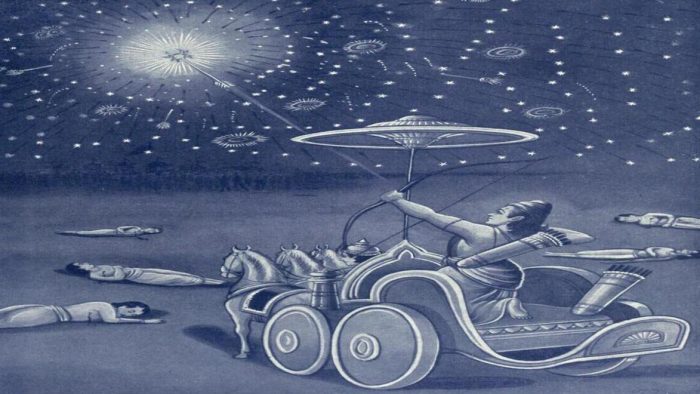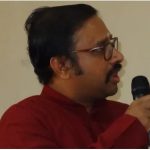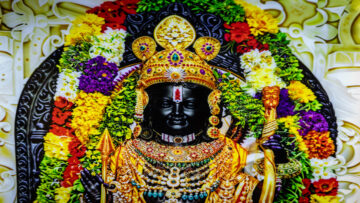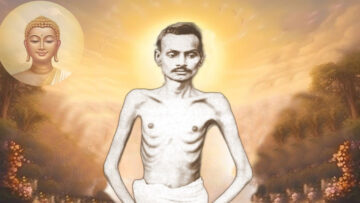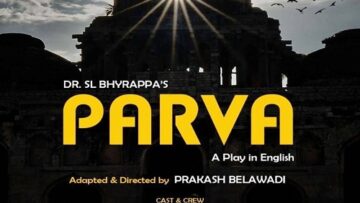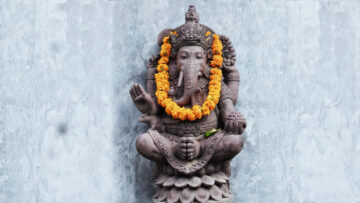Ashwatthama, son of Dronacharya, is a quiet but continuous presence throughout the Mahabharata. Towards the end of the Kurukshetra war, in the Souptika Parva, he explodes through his ghastly performances. He comes into his own from being a tertiary character to being a significant character containing insight.
In the Mahabharata, Maharshi Vyasa has not introduced a single character for the sake of it. In the form of Ashwatthama, he has crafted an illuminating metaphor that continues to shake the consciousness of civilization forever.
He represents the Karmic results of one’s action and inaction. It quietly follows us like a shadow and grows slowly. But he explodes after a point bringing such ruin, ignominy, and infamy for all concerned.
When Duryodhana fell in the duel of mace, only three on the Kaurava side remained alive – Ashwatthama, Guru Krupacharya, and the Yadava chieftain Krutavarma. The war had effectively ended after his fall. They visited Duryodhana when everybody left.
Ashwathama was overcome with emotion at the plight of his Master Duryodhana. He was already burning with anger by the manner in which Dhrushtadyumna had ended his father’s life.
In a fit of rage, he took a formal vow, with ritual waters, that he would bring an end to Dhrishtadyumna, the Pandavas, and the entire Pandava-Panchala army.
Duryodhana formally crowned him as the chief of the Kuru army and gave him a Deeksha to seek revenge on his behalf.
That night, afraid of the Pandavas, they entered the forest. As they contemplated the next steps, Ashwatthama saw an owl quietly entering a tree full of crows sleeping.
The owl killed the entire families of crows in their sleep. Ashwatthama stood with a new spark in his mind. He knew that in a direct battle he stood no chance of defeating the Pandavas. He woke up Kripacharya and Krutavarma to explain his scheme.
In his defense, he described all the unrighteous actions performed by Pandavas to secure victory. Krutavarma and Kripacharya were shocked in disbelief and hung their heads in shame. Krupacharya went to great lengths to prevail upon AShwatthama to cease from his cruel and adharmic means.
“My dear Ashwatthama – it is only Purushaprayatna and Daivasahaya through which one can achieve great feats. An adharmic act will not have Daivabala. That is how Duryodhana too met his end.
Let us seek the advice of Vidura, Dhritarashtra, Gandhari before undertaking any feat further” exclaimed Kripacharya. But Ashwatthama would have none of it. He was singularly minded in exacting his revenge.
“I am a Brahmana who has changed his path of life to become a Kshatriya. I cannot go back to the path of a Brahmana. Like a Kshatriya I must achieve my revenge” said the fierce Ashwatthama.
Krupacharya sought a suspension of his plan at least till the dawn. Ashwatthama wasn’t sure of anything till morning. He proposed to bring his thoughts to action with great immediacy.
Finally, Krupacharya directly said that this is an act of Adharma. A vengeful Ashwatthama had all his defenses ready. He listed all devious actions indulged in by the Pandavas to secure a victory. Finally, Kripacharya and Krutavarma gave up.
The trio set themselves to reach the gates of the Pandava camp. Ashwatthama sought that the Acharya and the Yadava stand guard at the entrance. He asked them to ensure that nobody escaped from the camp. He then entered the camp to execute his ghastly night assault. But there was a surprise that awaited him.
There was a fierce Mahabhoota standing just after the entrance. It was gigantic and full of special weapons and powers. Ashwatthama used all his prowess of Shastras and Astras to defeat the Mahabhoota but he failed.
A distraught Ashwatthama remembered Krupacharya’s words. He acknowledged his unrighteous actions for a moment and lamented the absence of Daivabala. He decided to seek Daivanukula and performed a fierce and austere sacrifice right at that place invoking Lord Mahadeva.
The great Lord appeared. He assured his special powers for Ashwatthama for the day. He was protecting the Pandava and Panchala army because of Srikrishna. But then Kaalapurusha had already decided that the two armies were to meet their end. He gave a special sword to Ashwatthama and disappeared.
With Mahadeva’s special powers with him, there was nothing that anybody could do that day. The Pandavas, Satyaki, and Srikrishna were not at the camp.
Ashwatthama entered the camp like Lord Yama himself. His first target was Dhrishtadyumna, naturally. He entered his camp, caught hold of Dhrishtadyumna, and began to assault him in gory ways.
A sleepy and injured Dhrishtadyumna, unable to fight, sought that he should be killed with Shastras befitting a Kshatriya. His pleas fell on deaf ears. Ashwatthama sought the worst of all revenge. He killed Dhrishtadyumna with blows on his body and banging him to the ground.
Thus Drushtadyumna met the goriest of deaths at the hands of a bloodthirsty Ashwatthama. He then set his wrath on the Panchala army and the Pandava army. The Panchala Maharathis, Yudhamanyu, and Uttamoujas fell to the sword of Ashwatthama.
Finally, Upapandavas, sons of Pandavas from Draupadi, fell one after the other gloriously fighting Ashwatthama. Whatever was remaining of the Pandava army, after the death of Duryodhana, was wiped out by Ashwatthama on that deadly night. The Rakshasas enjoyed a great feast of blood and flesh.
The trio rejoiced at their performance and left. They immediately met Duryodhana to appraise him of the revenge. Hearing this, Duryodhana brought a little solace to his mind. Very soon, he left his body for the heavens.
At that moment, Sanjaya lost his special powers to report the war to Dhritarashtra. He ended his narration to the King deploring him for the absolute destruction and ruin that his actions brought.
In the meanwhile, the charioteer of Dhrishtadyumna alone had escaped the camp while Krutavarma looked the other way. He saved himself to narrate the disaster to the Pandavas. Yudhisthira collapsed at the news while the other Pandavas burned with anger.
Yudhisthira rightly wondered how Draupadi would withstand the loss of all her children. Soon they brought Draupadi and Dhrishtadyumna’s wife to the camp. After a brief collapse into immense grief, the great Queen recovered herself and implored upon the Pandavas to exact a revenge with the death of Ashwatthama.
“I shall give up my life otherwise” declared Draupadi. As evidence, she sought the special gem in Ashwatthama’s head which brought in him so much power and arrogance.
In particular, she addressed Bheemasena as the chief protector of the Pandavas and implored upon him to exact rightful revenge. Already burning in anger, Bheemasena at once proceeded with Nakula as his charioteer.
Srikrishna was worried. He knew that Ashwatthama possessed a special Astra named Brahmashiras. It was only Arjuna who could neutralize Brahmashiras. He chided Yudhisthira for having allowed Bheema to go ahead of Arjuna.
He narrated two incidents about Ashwatthama. When Dronacharya taught Brahmashiras to Arjuna, Ashwatthama was filled with jealousy. He complained to his father that he was not given this Astra. Out of his excessive love for Ashwatthama, Drona made the mistake of presenting it to him too.
But finally, he gave a warning “Ashwatthama – the Astra is not to be released even during an emergency and certainly not on human beings”.
His ‘Moha’ for his son had not blinded Drona completely. He knew that his son had a wavering mind. “My son, I know your mind and your ways. You will not always be in good company. You should be very careful with this Astra”.
These words of caution only angered Ashwatthama further. He set himself out into a fierce wandering of the earth. He reached Dwaraka and was well received by the Yadavas.
In their company and honor, Ashwatthama relieved his anger and indulged himself in pleasure. One day, he met Srikrishna and made an offer. “Krishna, my father has taught me Brahmashiras. I would like to offer the same to you if you were to let me have your Chakra”.
Instead of his customary smile Srikrishna laughed. “Oh the unwise Ashwatthama, you could have any weapon of mine, including the Chakra, if only you could lift them. I do not need your Brahmashiras”. An arrogant Ashwatthama failed to lift any and suffered humiliation.
Srikrishna then lamented his ill-conceived thought. “Ashwatthama, I performed twelve years of Tapas in the Himalayas, while Rukmini performed severe austerities before we received Pradyumna.
One must perform great Tapas before receiving anything divine. You should have the ability to contain the same within you.
None of my children ever sought what you did. Why do you need my Chakra?”. Ashwatthama said he wanted to be invincible and even fight Srikrishna himself to establish his superiority.
Srikrishna narrated these two incidents to the Pandavas. He sought that they at once proceed so that Arjuna could face Ashwatthama.
They hurried behind Bheemasena and finally reached the banks of Ganga. Ashwatthama was sitting along with Maharshi Vyasa. Upon seeing Bheemasena, Ashwatthama panicked and immediately released Brahmashiras with the effect of “Apandaveya – let there be no more Pandavas”.
Srikrishna called Arjuna twice with an uncharacteristic concern. “Arjuna, Arjuna – release the Brahmastra immediately to neutralize Brahmashiras. Arjuna performed his prayers and summoned Brahmastra. “Let good fall upon the son of Acharya.
Let good fall upon me and my brothers. I only seek to neutralize the Brahmashiras released by Acharyaputra”. He bowed to all gods, sages, and elders before releasing the Brahmastra called Brahmshiras.
The two weapons approached each other with great ferocity. The Universe trembled. All the gods, sages, and other heavenly beings assembled in the sky with great concern about the impending destruction.
Maharshi Vyasa and Maharshi Narada woke up from the heat resulting from the conflict. They ascended to the sky and stood between the two Astras.
They could only momentarily hold them from a clash but not neutralize them. The Astras could only be neutralized by ones who released them.
“They wondered why they sought to destroy themselves and the universe. They implored upon them to withdraw the weapons immediately.
The Astra was special and divine. Only those who performed strict austeries, ones with absolute control over one’s own senses could withdraw a released Astra such as this.
Arjuna could but Ashwatthama could not. He lamented his inability to do so not possessing the right Tapas. Maharshi Vyasa praised the highest Kshtradharma demonstrated by Arjuna.
He wondered why Ashwatthama had chosen to release Brahmashiras to kill Pandavas. He urged him to give up the gem in his head so that Pandavas could spare his life in return.
Ashwatthama explained the importance of that Mani. He agreed to give up the same to the Pandavas but lamented his inability to withdraw the Astra. It had to meet exactly that end for which it was released.
Ashwatthama had said “Apandaveya” and that had to come true. He decided to direct it to the Pandava Garbha – the future of Pandavas ie., the womb of Uttaraa, Abhimanyu’s wife.
Srikrishna was furious. He reminded Ashwatthama of the prediction of a Sadhu that Uttara would give birth to a son who would continue the lineage of the Pandavas after this testing time.
The words of a sage did not go false. Ashwatthama expressed his helplessness. Srikrishna then announced that the child would be revived. He cursed Ashwatthama. He would be known as a coward, sinner, and killer of children.
He would roam around the world all alone, full of disease and puss, his blood full of foul smell, without being able to speak to anyone and without any good purpose. He would have no help from anybody. Ashwatthama would not live in the midst of any person and people.
He would suffer many illnesses in his prolonged, burdensome life. Maharshi Vyasa deplored him for deviating from the path of a Brahmana without following the complete Kshatra dharma.
Finally, through his special powers, Srikrishna revived the child in the womb of Uttaraa. He came to be known as Pareekshita as he went through the highest test while being in the womb.
With his gem lost, with a humiliating defeat in front of all beings, Ashwatthama finally grounded himself. He lamented all his actions and sought that he be granted the company of Vyasa as he suffered the curse.
The Pandavas returned to the camp. They presented the gem to Draupadi. “The son of Acharya and a Brahmana ought not to be put to death. But without his gem, he is as good as dead”. Draupadi agreed with the Pandavas.
The story of Ashwatthama is one extreme warning to humanity. Ashwatthama was born in the exalted Bharadwaja parampara. He received the best Shiksha from his father and uncle – Kripacharya.
Yet his journey was from being a representative of a great Brahmana Kula to a condemned, isolated individual who erred on all Dharmas leading himself and the world to a disaster. He was the result of all deviating actions of his ancestors on both sides.
Kripa’s father Sharadvanta was the son of Sage Gautama. From his childhood, he was attracted to Dhanurvidya more than Vedadhyana. He taught Kripa Dhanurvidya, after which he became the Acharya of the Pandavas.
Drona, on the other hand, was taught Dhanurvidya by his father’s disciple Agnivesha. He married Kripi – Acharya Kripa’s sister. Drona went a step further and sought divine weapons from Parashurama.
When he could not provide enough for his family he chose to seek material wealth from King Drupada, his old friend. His final trigger was not being able to provide milk to his son Ashwatthama.
It was that immense love for Ashwatthama that drove him to seek wealth from Drupa. The resulting insult drove him to the Kuru Kingdom where he virtually lived the life of a Kshatriya.
Thus Ashwatthama was born in the marriage of two families that deviated from their Brahmana paths without completely becoming Kshatriyas. He grew in the company of Kshatriyas without fully becoming part of either a Brahmana ecosystem or a Kshatriya ecosystem.
In addition, Drona’s Moha for his son resulted in his never being reigned. Waywardness and impulsiveness was a permanent attribute of Ashwatthama. In spite of knowing his limitations, Dronacharya taught him divine powers that required immense Tapas.
He even sought to teach certain exclusive powers to his son. But Arjuna’s dedication, passion, and perseverance ensured that Arjuna had greater access.
Arjuna received the greatest affection and love of Drona. But Ashwatthama had the advantage of Drona’s Putramoha. Thus Ashwatthama grew to be a seed of disaster in the future.
It is in this confusion that Ashwatthama grew. He neither knew of himself as a Brahmana nor as a Kshatriya as he himself admitted his confusion to Acharya Kripa.
As a result, Kripa’s beautiful words of wisdom made no impact on him. He sought Brahmashiras from his father but did not wonder if he had the Tapas to contain the same within him. Worse, he could not even hold words of caution and wisdom from his father.
He sought weapons to become invincible – for no other righteous purpose. That he made a business-like offer to Srikrishna, sought Chakra from him, and fought with him clearly shows that he failed to recognize divinity either.
He singularly pursued his self-interest with Duryodhana. Finally, when everything else collapsed around him, a sense of revenge blinded him. In that, he failed in both Brahmana Dharma and Kshatra Dharma.
Thus Ashwatthama was the result of all deviations of his families on either side. In addition, he was the result of all actions of the Kauravas. His waywardness is a metaphor for what happens when one grows up in two ecosystems partially imbibing neither of them in their integrity.
He became a repository of all ill-acts of the ecosystems he grew in. When the repository overflows it results in an explosion. Such growth and indulgence only result in immense disaster – not only as a one-time act.
Ashwatthama’s action threatened to stretch deep into the future by destroying Uttaraa’s womb. When we create such disasters, it is only divinity that can save the day. Ashwatthama is that enormous warning to humanity.
Finally, the curse handed out to him represents what befalls the greatest when they deviate from their paths beyond a point. Death would have been an instant but relieving punishment for his heinous crimes.
But, as a Brahmana, Ashwatthama suffered a lot more – a prolonged but unliveable, painful life. It is also a metaphor for what befalls on humanity when the greatest of us deviate and become destructive.
Our acts and performances have a far greater life than we imagine. Our destructive actions can have a long winding impact on the future unless Divinity itself intervenes to limit.
We must constantly look for that Ashwatthama who we could be growing quietly and unknowingly. Let an Ashwatthama never explode upon us ever.
Disclaimer: The opinions expressed in this article belong to the author. Indic Today is neither responsible nor liable for the accuracy, completeness, suitability, or validity of any information in the article.

